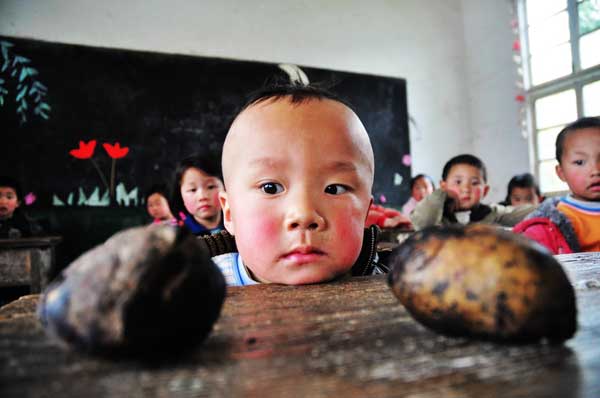Safety shadows rural kids' free lunch
Although the school lunch program started by netizens has helped improve some rural students' nutrition, concerns over food safety and other factors still threaten the grassroots campaign.
"I am worried that the schools may not have the ability to conduct quality checks on the raw materials they have purchased for cooking," said Yu Jiantuo, program director of the China Development Research Foundation.
If an illness is linked to the food served at those schools, the government will cease allowing the free lunches to be distributed, Yu said.
"So it's very important to cooperate with government quality supervision departments, which have the resources and expertise to conduct independent tests of food," he said.
Experts also raised questions over whether it is right that the program benefits only primary schools in the countryside.
"I doubt whether this program can last long since most primary schools in villages are doom to be merged," said Zhuang Wei, secretary general of the Beijing Cihong Charity.
Enrollment in the country's rural schools shrank in the 1990s for a couple of reasons. The Chinese are moving in ever larger numbers from rural to urban areas. And the country's family planning policy has led to a decrease in the number of school-aged children in the population.
In response, China decided in 2001 to begin centralizing village primary schools. Government officials believed doing so would give them a better way to distribute resources and improve the quality of teaching.
"What if village primary schools were shut down in the future?" Zhuang said. "If so, school canteens and other places used for cooking will be wasted."
Meanwhile, administrative staff members at the schools selected for the free lunch program told China Daily that they need more than lunches to help their students do better in their studies.
"Teachers come and go each year because they cannot bear the tough and dreary living conditions here," said Qu Kaiwei, head of Hongban village and representative of the school.
Four teachers live in a crowded bedroom belonging to Qu, who provided it for free.
"You don't know how badly we need teachers," he said.
The free-lunch program has meanwhile caught the government's attention.
The education bureau in Qianxi county has decided to help the school build dormitories for teachers.
"Part of the money was donated by officials and employees in the bureau," said Long Shengyong, an official from the education bureau in Qianxi county.
Even though many acknowledge the benefits of having more dormitories, Long said local governments unfortunately cannot afford to build them for every primary school in Qianxi.
"The government has also paid a great amount of attention to the nutrition of poor village students," said Song Wenzhen, director of the children's department of the National Working Committee on Children and Women.
"So far, the government has offered a subsidy of 50 yuan ($7.70) a month for every poor student that attends a boarding school in rural areas," Song told China Daily.
"Even so, we have noticed that malnutrition is prevalent not only among the students living in boarding schools but also among students who live at home."
The government is looking at offering subsidies to more students, she said.
According to Song, the government will place a priority on building more boarding schools in mountainous and remote areas, where harsh road conditions make it difficult for students to commute between school and home.
To really improve conditions for village primary schools, the disparities found between the roads and means of transport in rural and urban areas should be eliminated as much as possible.
Wu Shao'an, a critic from a newspaper in Guizhou province, said the existence of such disparities has been exposed in part by the reports showing that children from mountainous regions often must go without lunch.
The reports have revealed how difficult traveling in the countryside can be and how great the need is for the government to spend more on public transport and roads, Wu wrote on his blog at sina.com.
 0
0 







